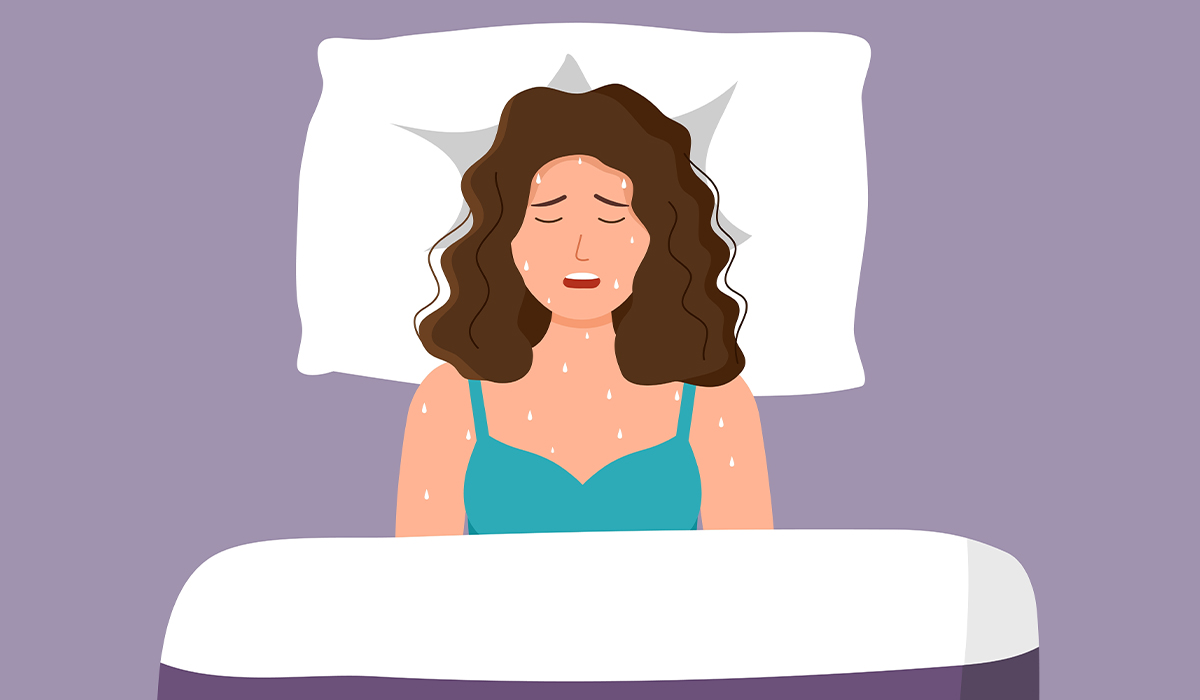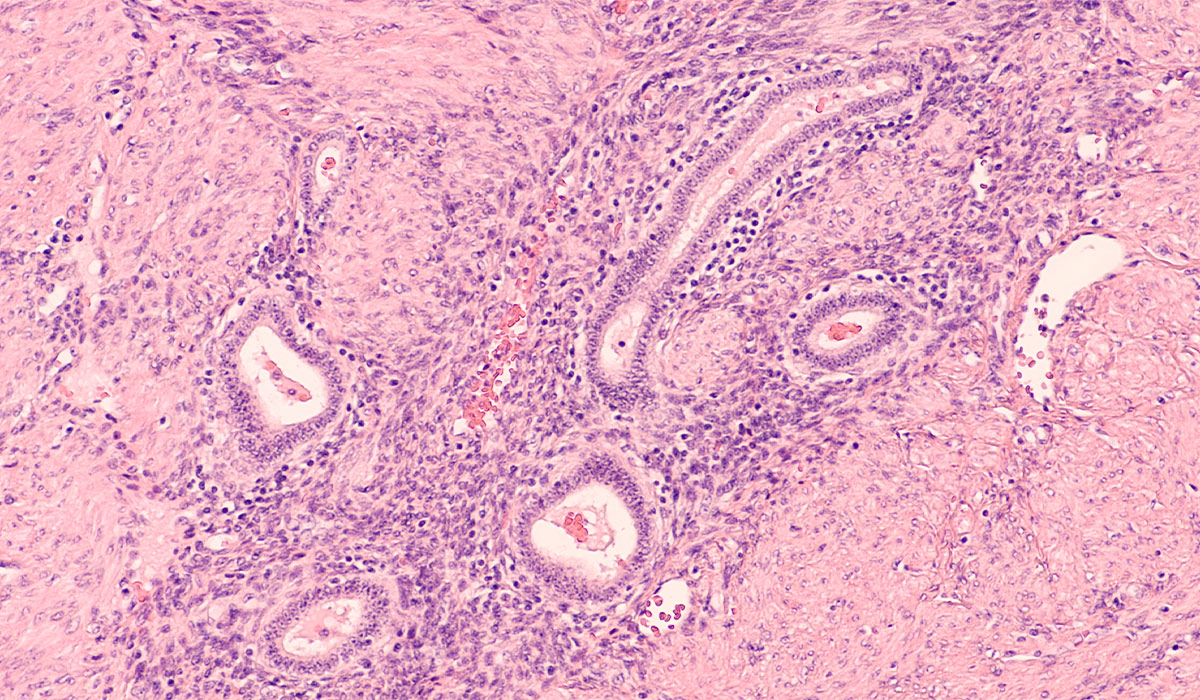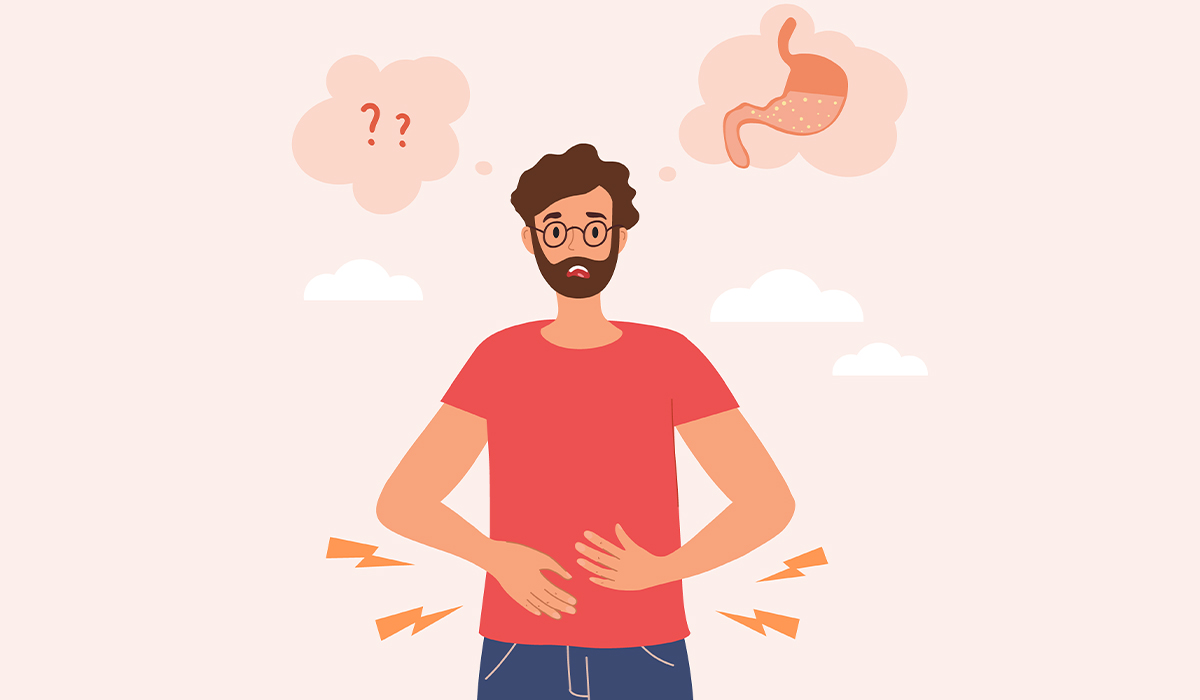Perimenopause refers to the time during which the organism naturally transits to menopause. It is the mark of the end of the reproductive years.
People start perimenopause at different ages. You can catch symptoms of progression toward menopause sometime in your 40s. However, some women notice differences as early as their mid-30s.
The estrogen level in the body increases and decreases unevenly during perimenopause. Your menstrual cycles may be longer or shorter. There may also be cycles in which your ovaries don't release an egg (you do not ovulate). Moreover, some people experience menopause-like signs, like hot flashes, trouble sleeping, or vaginal dryness.
Once you've gone through 12 months without a menstrual period, you've started menopause – the perimenopause period is over.

Menopause![]() is the moment of the complete end of menstruation for physiological reasons. It occurs at 50-55, but it does not happen overnight. The first symptoms of cessation of ovarian hormonal activity may appear several years earlier. These are most often typical symptoms of menopause: feeling weak, mood swings, hot flashes, and paroxysmal sweating.
is the moment of the complete end of menstruation for physiological reasons. It occurs at 50-55, but it does not happen overnight. The first symptoms of cessation of ovarian hormonal activity may appear several years earlier. These are most often typical symptoms of menopause: feeling weak, mood swings, hot flashes, and paroxysmal sweating.
The menopause process consists of three phases:
On average, menopause lasts ten years, although cases lasting up to a dozen or so years are possible.
According to the definition of the World Health Organization![]() (WHO), menopause is the last menstrual period, after which there has been no menstrual bleeding for at least 12 months.
(WHO), menopause is the last menstrual period, after which there has been no menstrual bleeding for at least 12 months.
However, the term is commonly used in a broader sense – to describe a gradual, many-year-long process of quenching the hormonal activity of the ovaries, which is accompanied by characteristic symptoms.
The first symptoms of menopause appear on average about 5-6 years before the end of menstruation, although some women may observe them (although not always associated with menopause) even earlier, even 10-12 years before this moment.
Here are some of the changes![]() you may experience:
you may experience:
Moreover, the first symptom of menopause is the body's response to the decreasing amount of estrogen in the organism. The fastest to appear are:
These are characteristic symptoms of menopause syndrome. When they appear, most women are still at the peak of their lives – they are professionally active, traveling, practicing sports, and building new relationships and friendships; many take care of their growing children and enjoy the joys of late motherhood. That is why it is so difficult for them to accept that sadness, anger, or lousy mood attacks may be related to menopause.
The first symptoms of menopause are often confused with overwork, stress, and fatigue, especially when they are not accompanied by significant menstrual disorders (or when a woman uses hormonal contraception), which is typical for the first period of menopause.
Unlike the first symptoms of menopause, the later symptoms that develop over time affect the functioning of the entire body – problems with the urogenital system appear (vaginal dryness, pain during intercourse, loss of tissue volume, recurrent intimate infections, stress urinary incontinence).
There is a sudden deterioration of skin quality and menopausal aging associated with a rapid loss of collagen, dryness, and tissue sagging, the skin becomes thin and sensitive, has a gray, earthy color and discoloration, and hair begins to fall out, is increasingly difficult for a woman to maintain weight despite a proper diet, abdominal obesity appears, as well as other diseases co-occurring with menopause, such as osteoporosis. Late menopause symptoms may persist with varying degrees of severity for the rest of your life.
In the early stages of perimenopause, many women continue to menstruate normally, so recognizing the symptoms of menopause can be difficult. However, if something worries you – you notice recurrent hot flashes, you are chronically tired or often irritated – it is worth going to a doctor who will confirm the first symptoms of menopause.
The basic diagnostic test![]() is to check the concentration of follicle-stimulating hormone (FSH), which influences the course of the menstrual cycle, stimulates ovulation, and regulates the process of maturation of Graafian follicles in the ovaries and the secretion of estrogens in the ovaries. Its increased level indicates menopause (in the initial phase, estrogen levels may still be normal).
is to check the concentration of follicle-stimulating hormone (FSH), which influences the course of the menstrual cycle, stimulates ovulation, and regulates the process of maturation of Graafian follicles in the ovaries and the secretion of estrogens in the ovaries. Its increased level indicates menopause (in the initial phase, estrogen levels may still be normal).
The menopause test can be done at home – plate tests (urine) available in pharmacies detect FSH with a concentration of 30 mlU/ml or higher. More detailed hormonal tests (FSH, LH, estradiol, progesterone) will be ordered by your doctor, who will also perform a gynecological examination (it allows you to detect estrogen deficiency in the vaginal and vulvar mucosa) and an ultrasound (it will examine the thickness of the endometrium).

Many women who recognize the first symptoms of menopause (and, for example, have not had a period for 2-3 months) mistakenly believe that it is no longer possible to get pregnant![]() during this period. Until 12 months have passed since the last menstrual period, anything can happen – because we have no guarantee that the ovarian activity has wholly stopped (unless hormonal tests confirm this).
during this period. Until 12 months have passed since the last menstrual period, anything can happen – because we have no guarantee that the ovarian activity has wholly stopped (unless hormonal tests confirm this).
Therefore, it is recommended to use contraceptives during this period. Although, in many cases, late motherhood is a reason for joy, it must be remembered that pregnancy after the age of 40 is, from a medical point of view, a high-risk pregnancy associated with a greater risk of, among others, miscarriage, fetal defects, premature birth or preeclampsia.
What method of contraception![]() should I choose during perimenopause?
should I choose during perimenopause?
However, it should be remembered that hormonal contraception may “mask” the symptoms of menopause, such as menstrual disorders.
Menopause is not a disease, but if its first symptoms are troublesome, it is worth looking for ways to alleviate them.
During menopause, the metabolic rate drops dramatically, which is why women during menopause often gain weight. The extra kilos will appear suddenly, and it is tough to get rid of them, even using proven methods. The distribution of fat tissue in the body also changes – its excess accumulates around the abdomen and surrounds the internal organs. The reason for this state of affairs may be, among others: a decrease in estrogen levels in the body, sleep disorders, insulin resistance, or type 2 diabetes. Therefore, it is worth considering an appropriate diet![]() , individually adapted to you.
, individually adapted to you.
Regular exercising![]() is essential for menopausal women as it has many benefits for the circulatory system, heart, general fitness, and figure. Moreover, it prevents the development of osteoporosis, atherosclerosis, hypertension, and diabetes. By staying physically active, we also improve our well-being.
is essential for menopausal women as it has many benefits for the circulatory system, heart, general fitness, and figure. Moreover, it prevents the development of osteoporosis, atherosclerosis, hypertension, and diabetes. By staying physically active, we also improve our well-being.
The type of exercise should, of course, be adapted to the woman's condition, health condition, and preferences, but the most popular forms of physical activity for mature women are aerobics (e.g., brisk walking, walking, jogging or cycling), strength training, stretching or exercise.
Lubricants![]() effectively relieve pain and discomfort during intercourse in women with mild to moderate vaginal dryness or in women who cannot or do not want to take hormonal medications. You should choose products with composition and pH as similar to natural vaginal secretions.
effectively relieve pain and discomfort during intercourse in women with mild to moderate vaginal dryness or in women who cannot or do not want to take hormonal medications. You should choose products with composition and pH as similar to natural vaginal secretions.
If there is no improvement after a few weeks, uterine bleeding or bleeding occurs after intercourse, you should see a doctor.
Hormone replacement therapy![]() (HRT) is beneficial for many women. It aims to supplement the decreasing hormones. It not only reduces the early symptoms of menopause but also prevents its long-term consequences, such as osteoporosis. It also affects the skin and hair condition and prevents vaginal dryness and urogenital symptoms.
(HRT) is beneficial for many women. It aims to supplement the decreasing hormones. It not only reduces the early symptoms of menopause but also prevents its long-term consequences, such as osteoporosis. It also affects the skin and hair condition and prevents vaginal dryness and urogenital symptoms.
Treatment involves replacing the natural hormonal function of the ovaries by administering estrogens (estrogen replacement therapy![]() , ETZ) or estrogens and progesterone (HRT) in minimum effective doses. The most frequently used are natural estrogens, which have the most physiological effects and are well tolerated by the woman's body.
, ETZ) or estrogens and progesterone (HRT) in minimum effective doses. The most frequently used are natural estrogens, which have the most physiological effects and are well tolerated by the woman's body.

The lower the estrogen level in the body, the more rapid the loss of firmness and elasticity of the skin![]() – the tissues begin to sag, wrinkles and furrows deepen, and skin dryness increases. These are the symptoms of the so-called menopausal aging. Therefore, remember that during perimenopause, proper skin care is significant to prepare for these changes and slow them down. What should you especially remember?
– the tissues begin to sag, wrinkles and furrows deepen, and skin dryness increases. These are the symptoms of the so-called menopausal aging. Therefore, remember that during perimenopause, proper skin care is significant to prepare for these changes and slow them down. What should you especially remember?
Moisturize your skin intensively to prevent it from drying out. Avoid exposing your skin to factors that may increase dryness.
If you notice sudden erythema and reddening of the skin, use creams for vascular skin and rosacea to calm the symptoms.
In your daily care, choose rebuilding creams intended for menopausal skin. Don't just reinforce the hydro-lipid skin layer, but also firm and thicken it, keeping it young.
Use ampoules with vitamin C or retinol at least twice yearly – these ingredients have proven anti-aging effectiveness. They stimulate collagen production, brighten the color, and prevent discoloration.
Protect your skin against UV rays – this is the main factor that damages the skin and causes visible symptoms of photoaging.
Remember that estrogen deficiency affects the quality and appearance of the face and the entire body. Areas that are often exposed, such as the neck, cleavage, and hands, are particularly vulnerable to accelerated aging.
We talk about premature menopause![]() , when the first symptoms of menopause appear before age 40 (sometimes, this even applies to women before age 35). It is also worth noting that currently, the term “premature menopause” is being replaced by another one, namely “premature ovarian insufficiency” (POI, primary ovarian insufficiency).
, when the first symptoms of menopause appear before age 40 (sometimes, this even applies to women before age 35). It is also worth noting that currently, the term “premature menopause” is being replaced by another one, namely “premature ovarian insufficiency” (POI, primary ovarian insufficiency).
It is usually not a natural physiological condition – early menopause (specifically – premature ovarian failure) may be a symptom of an autoimmune or neurological disease, e.g., thyroiditis (Hashimoto's disease), celiac disease, type I diabetes, rheumatoid arthritis, myasthenia gravis, etc. It is also believed that the contributing factor is the civilization stress to which modern women are exposed.
If you experience any alarming symptoms – always go to the specialist. It is advisable to have a gynecologist examine the reproductive organs and breasts, while an endocrine gynecologist should order specialized hormonal tests. Although hormones are examined, other factors like the functioning of the hypothalamic-pituitary-ovarian axis, thyroid gland, estradiol, progesterone, blood count, metabolic level, vitamin D, and calcium levels are also checked.
The perimenopause period is associated with the loss of normal hormone levels, and estrogens stimulate carbohydrate metabolism, lipid profile, and coagulation regulation. Therefore, if this is missing, it should be expected that there will also be unfavorable changes in medical tests.
Menopausal symptoms associated with premature menopause include primarily menstrual disorders (and ultimately amenorrhea) and ovulation and vasomotor symptoms like:
Yes, and it is called andropause![]() . It is a period in a man's life, also known as “male menopause” – characterized by various ailments and symptoms related to the multi-faceted aging processes of the body. This name was translated directly from the term female menopause – which is often criticized because the mechanisms of aging and the effects of these mechanisms on the bodies of women and men are not the same (for example, after menopause, a woman irreversibly loses her fertility, while in a man such a change does not occur – fertility only decreases).
. It is a period in a man's life, also known as “male menopause” – characterized by various ailments and symptoms related to the multi-faceted aging processes of the body. This name was translated directly from the term female menopause – which is often criticized because the mechanisms of aging and the effects of these mechanisms on the bodies of women and men are not the same (for example, after menopause, a woman irreversibly loses her fertility, while in a man such a change does not occur – fertility only decreases).
Table of Contents

Menopause is the time when a woman's body gradually changes from a fertile to infertile state. It is accompanied by… read more »

Ovulation is a key stage of the menstrual cycle in which the mature egg moves into the fallopian tube. What… read more »

Endometriosis is a long-term condition that can have a significant impact on your life. Learn how to recognise it and… read more »

Night sweats refer to excessive sweating during sleep that is unrelated to overheating or environmental factors. They are often associated… read more »

Adenomyosis is a chronic disease that can significantly reduce a woman's quality of life and limit her fertility. Learn how… read more »

Breast cancer is one of the most common cancers worldwide. It most often affects women. How is it diagnosed? Who… read more »

A bloated stomach is a condition characterized by a feeling of fullness, tightness, or swelling in the abdomen. What are… read more »

Do you know what pregnancy symptoms appear early? Hormonal changes can cause various symptoms of pregnancy. Find out what signals… read more »

Alopecia is a disease that manifests itself in various ways, including thinning or loss of hair. What are the causes… read more »